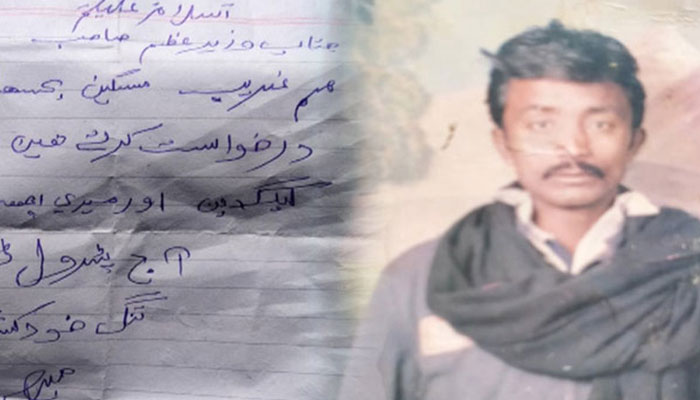Where the coffin is light and ‘clothes’ are heavy on the pocket
His shredded clothes with patches of charred skin were lying on the ground in a graveyard on Friday afternoon where he had set himself on fire two days ago.
Poverty-stricken Mir Hassan had punished himself for failing to provide warm clothes to his five children – three daughters and two sons. His eldest kid is around 12.
“The government, as we know, cannot provide jobs to people. How about just providing some relief to the disadvantaged citizens before they make it to their graves?” asks an incensed Zafar Abbas, a social activist, as he speaks with The News after a visit to the graveyard.
The bereaved family has been living in a cramped informal settlement on a vacant ground in Korangi since the family was forced to vacate their rented house recently. They have had no money; now, the kids don’t have their father too.
Hassan’s widow says her husband had brought home petrol in a bottle on Wednesday. He had told her that he would sell the petrol, which he had taken out of some vehicles, to buy warm clothes for the children shivering in the cold.
The man, instead, went to the graveyard in Ibrahim Hyderi, where he attempted to end his life. "It seems the petrol was less for sale but enough for suicide," Abbas sighs.
In a social media video posted by Abbas, eyewitnesses say they rushed to save Hassan and put out the fire. Immediately, Hassan was moved to the Abbasi Shaheed Hospital, where he succumbed to his burns a day later.
In his last days, Hassan had tried to eke out a living for his family by running a donkey cart. Earlier, he had done odd jobs and labour work, says Abbas. At last, he was flat broke.
Before his death, Hassan had written two short letters to Prime Minister Imran Khan. “He [Hassan] addressed the PM as janab and sahib [honourable and respected],” says Zafar, holding the letters in his hand.
The social activist brought for the family cash and clothes as he visited them on Friday. A businessman running a food outlet in Korangi has also pledged to provide a decent amount to the family every month for a year.
“But no politician or government official has given them a single penny so far,” claims Abbas. “Are they [politicians] running public offices just for photo sessions?” For Islamic scholar Muhammad Abid Shaikh, the incident “should have shaken the society to its core”.
“But we have become highly desensitised – in fact unsympathetic to ironies and tragedies. With this unkind attitude, how do we even expect God’s mercy?” he remarked. “And as far as one’s comfort in grave is concerned, our rulers should know that everyone has to answer about their acts and deeds after death. Those who would tell us the example of ‘a dog dying by the Euphrates’ are dead silent over the man’s suicide in the graveyard. It’s time we cared about our own graves!”
-
 Travis Kelce Plays Key Role In Taylor Swift's 'Opalite' Remix
Travis Kelce Plays Key Role In Taylor Swift's 'Opalite' Remix -
 How Jennifer Aniston's 57th Birthday Went With Boyfriend Jim Curtis
How Jennifer Aniston's 57th Birthday Went With Boyfriend Jim Curtis -
 JoJo Siwa Shares Inspiring Words With Young Changemakers
JoJo Siwa Shares Inspiring Words With Young Changemakers -
 James Van Der Beek Loved Ones Breaks Silence After Fundraiser Hits $2.2M
James Van Der Beek Loved Ones Breaks Silence After Fundraiser Hits $2.2M -
 Disney’s $336m 'Snow White' Remake Ends With $170m Box Office Loss: Report
Disney’s $336m 'Snow White' Remake Ends With $170m Box Office Loss: Report -
 Travis Kelce's Mom Donna Kelce Breaks Silence On His Retirement Plans
Travis Kelce's Mom Donna Kelce Breaks Silence On His Retirement Plans -
 Premiere Date Of 'Spider-Noir' Featuring Nicolas Cage Announced
Premiere Date Of 'Spider-Noir' Featuring Nicolas Cage Announced -
 Pedro Pascal's Sister Reveals His Reaction To Her 'The Beauty' Role
Pedro Pascal's Sister Reveals His Reaction To Her 'The Beauty' Role -
 Kate Middleton Proves She's True 'children's Princess' With THIS Move
Kate Middleton Proves She's True 'children's Princess' With THIS Move -
 Paul Anka Reveals How He Raised Son Ethan Differently From His Daughters
Paul Anka Reveals How He Raised Son Ethan Differently From His Daughters -
 'A Very Special Visitor' Meets Queen Camilla At Clarence House
'A Very Special Visitor' Meets Queen Camilla At Clarence House -
 Jodie Turner Smith Shares One Strict Rule She Follows As A Mom
Jodie Turner Smith Shares One Strict Rule She Follows As A Mom -
 Hailey Bieber Reveals KEY To Balancing Motherhood With Career
Hailey Bieber Reveals KEY To Balancing Motherhood With Career -
 Photo Of Jay-Z, Other Prominent Figures With Jeffrey Epstein Proven To Be Fake
Photo Of Jay-Z, Other Prominent Figures With Jeffrey Epstein Proven To Be Fake -
 Hillary Clinton's Munich Train Video Sparks Conspiracy Theories
Hillary Clinton's Munich Train Video Sparks Conspiracy Theories -
 Fans Slam Talk Show Host For 'cringe' Behavior In Chris Hemsworth Interview
Fans Slam Talk Show Host For 'cringe' Behavior In Chris Hemsworth Interview




